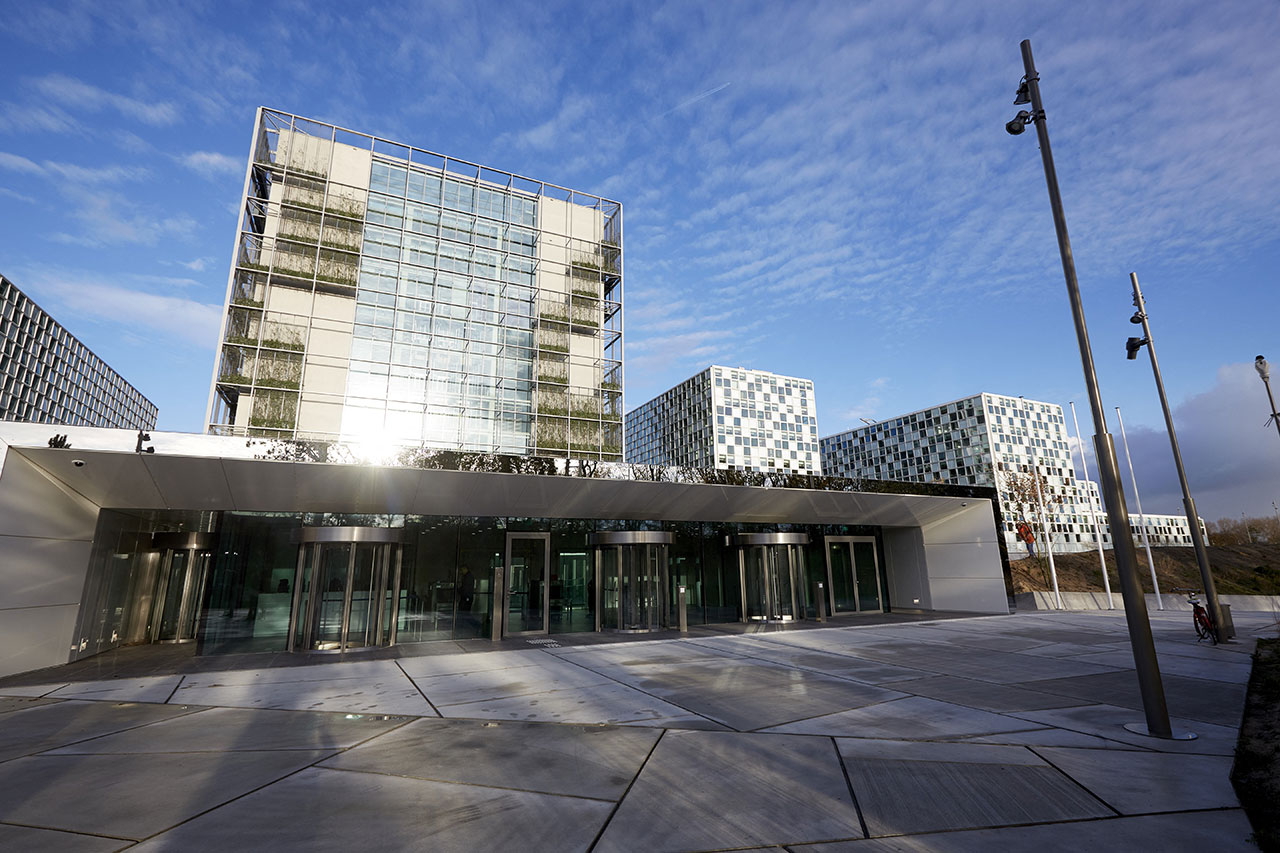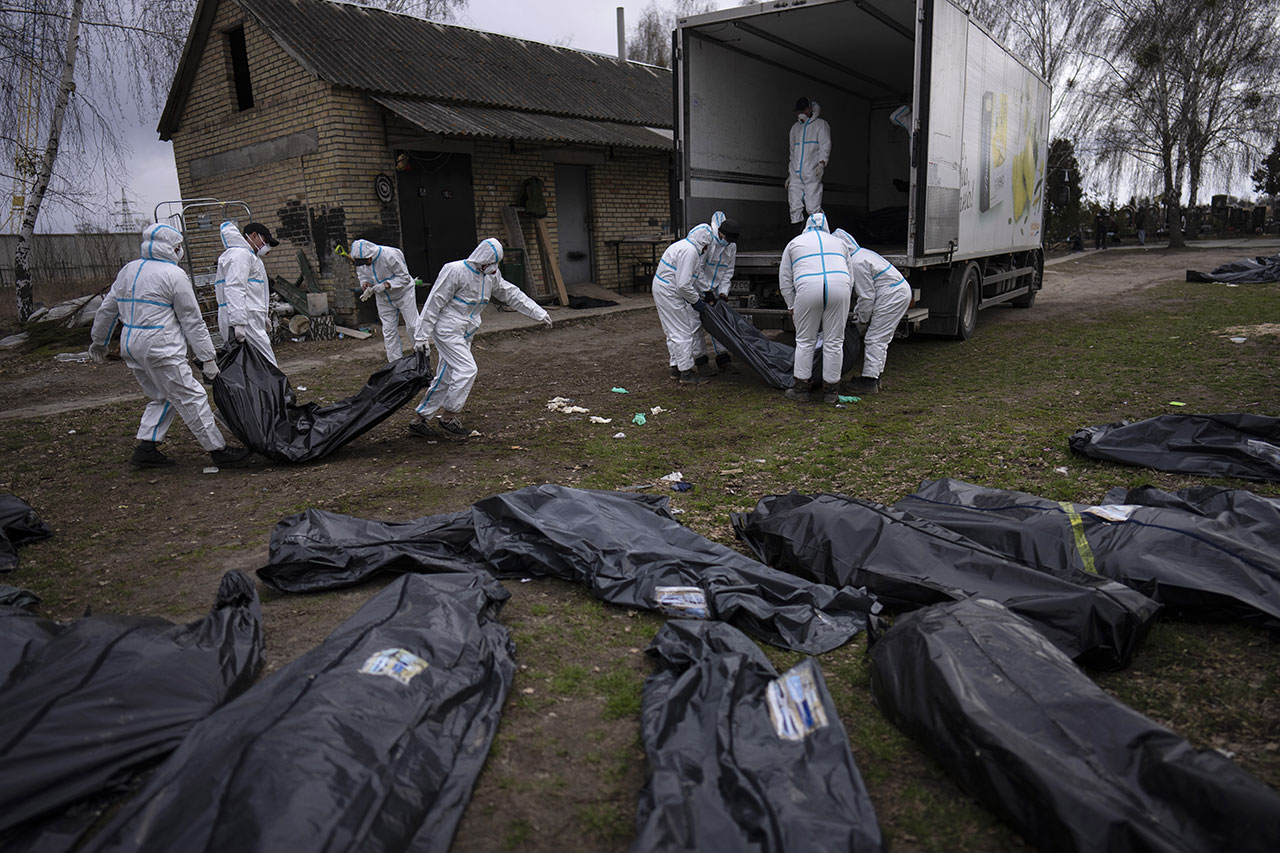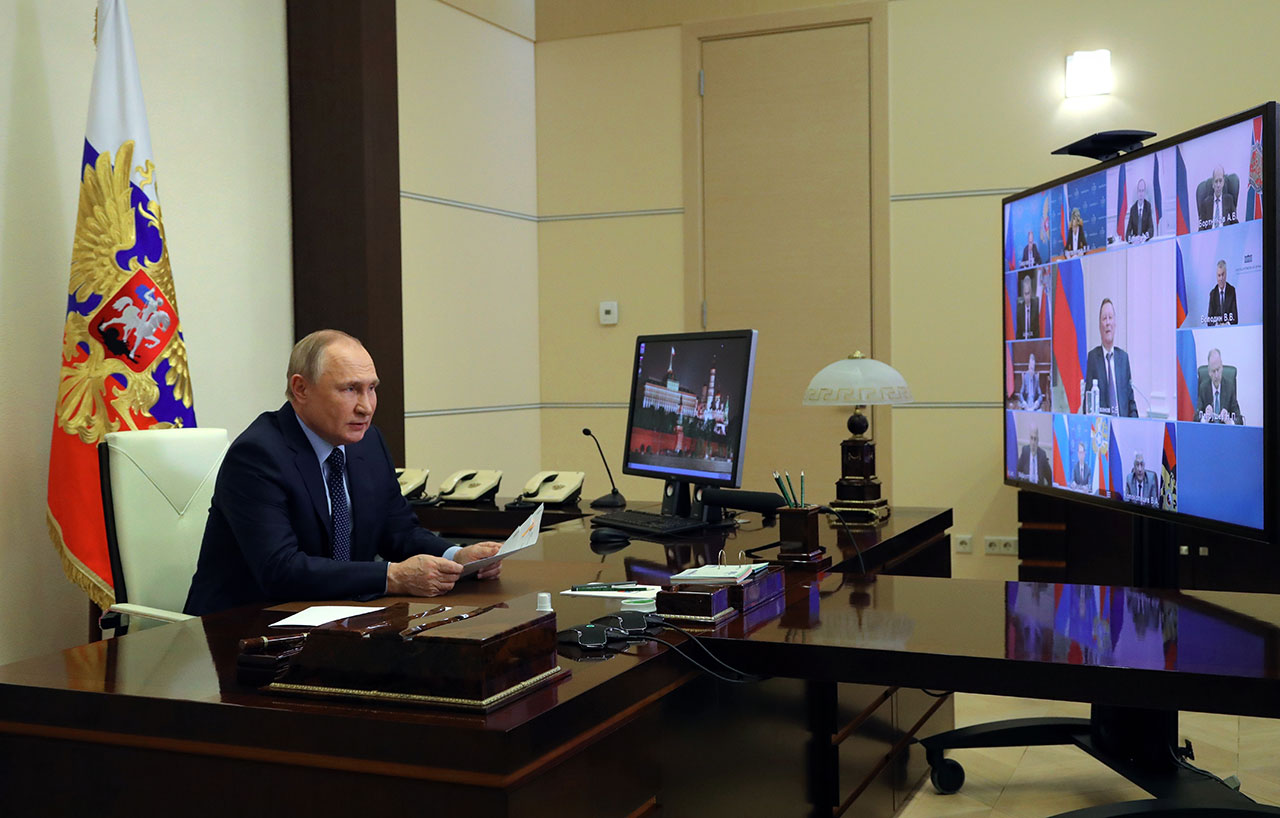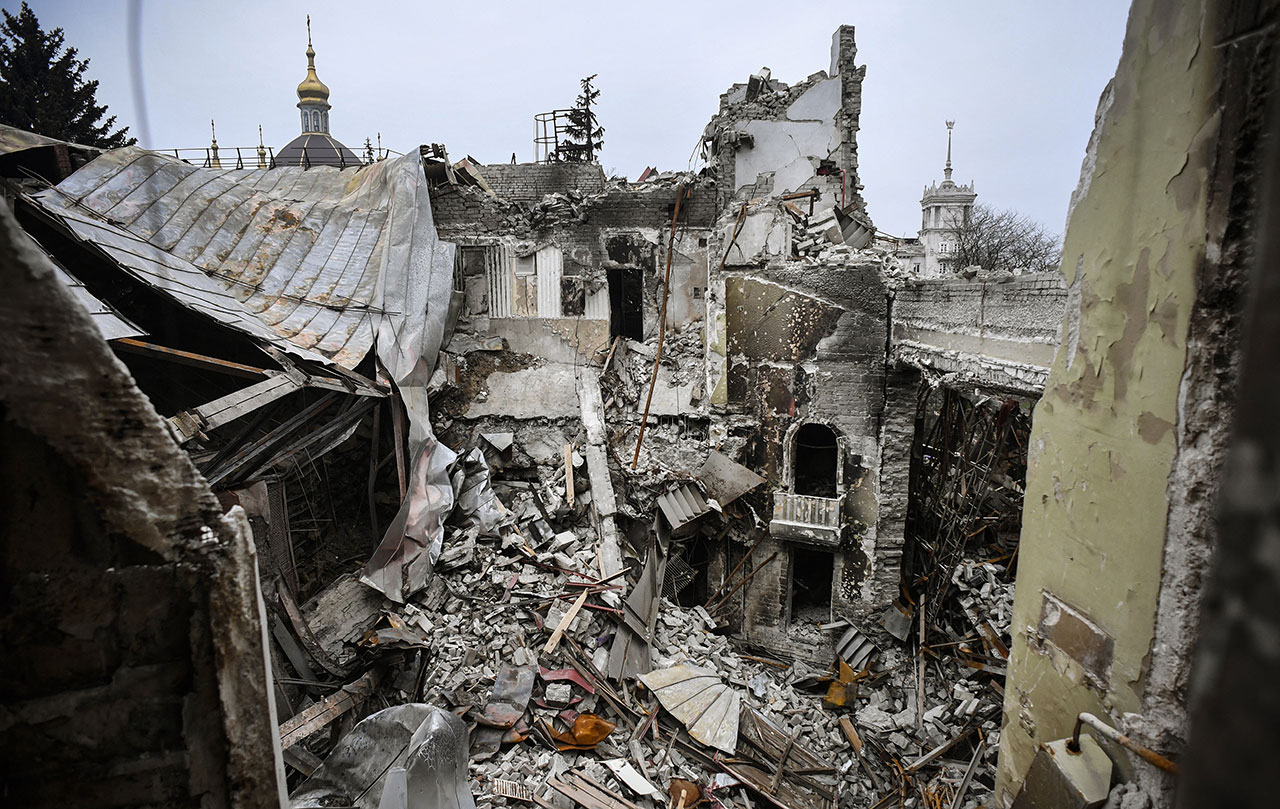Ukraine: What does it take to prosecute war crimes?
Accusations of war crimes have multiplied since the Russian invasion of Ukraine began on February 24, 2022. Several thousand civilians have been killed or wounded – often in violation of international law – in acts of war that could, in time, see perpetrators face justice in national courts or at the International Criminal Court in the Hague.
Reports of shocking atrocities in Ukraine have amplified calls for accountability and international efforts to bring the perpetrators to justice. Most of the allegations involve the actions of Russian forces in areas formerly or currently controlled by the Russian military.
Russian authorities have denied abusing civilians in Ukraine but international human rights groups have already documented wartime atrocities. Investigation teams, supported by international experts, are on the ground collecting evidence for possible future legal proceedings. But how will these crimes be prosecuted, and in which jurisdictions? And could Russian President Vladimir Putin face prosecution? FRANCE 24 takes a look at the international justice mechanisms that exist for prosecuting war crimes.
Jurisdictions and classifying international crimes
Perpetrators of abuses in Ukraine are likely to be prosecuted under any of three jurisdictions: the International Criminal Court (ICC), the Ukrainian justice system or the federal jurisdiction of any nation that opens an investigation.
Less than a week after the start of the Russian invasion, ICC prosecutor Karim Khan announced on March 2, 2022, the “immediate opening” of an investigation into possible war crimes. His office “found a reasonable basis to believe crimes within the jurisdiction of the Court had been committed”, Khan said in a statement, adding that the investigation would cover the situation in Ukraine “from 21 November 2013 onwards” – thereby encompassing the start of the Maidan revolution in Kyiv, the pro-Russian insurgency in the eastern Donbas region as well as the 2014 Russian annexation of Crimea.
The announcement came more than a month before Khan’s April 13, 2022, trip to Bucha following the withdrawal of Russian troops, when he declared the Kyiv suburb to be a “crime scene”.
The opening of the ICC investigation is based on Article 53 of the Rome Statute, a founding international treaty adopted in 1998 to which 123 countries are currently “States Parties”. These ICC rules of procedure codify, among other things, the prerogatives of the court and the legal criteria for crimes investigated in conflict zones. “Four criteria are possible for abuses committed: the crime of aggression, war crimes, crimes against humanity and the crime of genocide,” explained Emmanuel Daoud, a lawyer at the Paris bar specialising in international law who is also on the list of ICC lawyers.
The question becomes which of these four crimes – which increase in gravity – can be applied to the situation in Ukraine, as defined by the Rome Statute (Articles 6, 7, 8 and 8 bis).
“If we are talking only about Bucha – and only about the rapes and executions of civilians there – these are obviously war crimes. But if we take into account several cities in different places in Ukraine, and if the same methods are consistently being used by the Russian army, then we can talk about crimes against humanity,” Daoud explained.
The use of the term “genocide”, meanwhile, divides even Ukraine’s supporters. “These are war crimes, and they will be recognised by the world as genocide,” Ukrainian President Volodymyr Zelensky said in early April, after the discoveries in Bucha. Some world leaders, such as US President Joe Biden and Canadian Prime Minister Justin Trudeau, have also used the term. Others, such as French President Emmanuel Macron and German Chancellor Olaf Scholz, have been more circumspect.
Daoud advices caution: “We have not gathered, for the moment, evidence of the legal elements required for [prosecuting] the crime of genocide.”
In addition to the international investigation, domestic courts are also likely to bring charges against Russian officials suspected of being behind abuses in Ukraine. By the end of April, the Ukrainian judiciary had opened more than 7,000 investigations into war crimes and more than 3,000 into related crimes, according to Ukrainian Prosecutor General Iryna Venediktova.
Watch FRANCE 24’s interview with Ukraine’s prosecutor general
Some Western countries are also investigating allegations of Russian military abuses. Among them is Germany, which applies the principle of “universal jurisdiction”, allowing it to prosecute perpetrators of the most serious crimes regardless of nationality or where they were committed. Berlin is also a pioneer in this field: the same procedure led to the life sentence of a former senior Syrian intelligence officer in January 2022.
France is also pursuing cases in Ukraine, with the national anti-terrorist prosecutor’s office announcing in April that it had opened four investigations into war crimes, including one into the March 16 slaying of French-Irish journalist Pierre Zakrzewski near Kyiv. French prosecutors can open cases into war crimes committed outside France if the victims are French nationals.
Collecting evidence
Collecting evidence and painstakingly documenting the facts is essential in the lead-up to a successful prosecution. This is being done by experts on the ground in Ukraine, whether for judicial purposes – before going to the ICC or national courts – or for inclusion in independent reports to be published by rights groups and other organisations.
“A particularity of the war waged by Russia in Ukraine and the evidence being collected is that it is all being done in real time,” said Daoud. “It’s the first time this has happened in the history of international criminal justice.”
The ICC has its own team of investigators in Ukraine led by Khan – who, before taking up his current post, headed the UN investigators tasked with holding the Islamic State group to account for its crimes in Iraq between 2018 and 2021.
Some countries, such as the United States and France, have also allocated additional resources to the Hague-based court so it can conduct its investigations more quickly and effectively. France has donated €500,000 to the ICC and will also “make judges, investigators and experts available to the prosecutor” for his investigation, according to a French Foreign Ministry press release published March 23.
In addition, the Ukrainian authorities and countries supporting Kyiv have quickly deployed their own investigators. Among other initiatives, Lithuania, Poland and Ukraine on March 25 set up a “joint investigation team to investigate international crimes committed”, a move supported by Eurojust, the EU agency for judicial cooperation in criminal matters. France sent a team of gendarmes from the National Gendarmerie’s Criminal Research Institute to Ukraine in April to help identify victims and the cause of death.
Investigations are also being conducted independent of the judicial process by NGOs such as Amnesty International and Human Rights Watch (HRW). Both organisations use similar methodology, with investigators and experts working in the field as well as in teams collecting, verifying and cross-checking digital resources available on social networks or that are sent to them.
“It is work that relies particularly on interviews with victims, survivors and witnesses of possible abuses,” explained HRW’s France director, Bénédicte Jeannerod. “We complement this fieldwork with teams that will use the various sources available on social networks, as well as the expertise of our teams – such as when our weapons division documents Russian attacks by defining the type of strike, the type of weaponry used, and determining whether or not these weapons are prohibited under international law.”
The process consists of “combining two complementary methods” to establish the facts, according to Cécile Coudriou, president of Amnesty International France. “The first, used since the first days of the war in Ukraine, consists of remote research by people specialising in digital technologies – our ‘crisis evidence laboratory’. They can verify and authenticate the photos and videos we receive and collect – either by open source or by comparing them to satellite images – to enable us to establish the facts. The second is our experienced battlefield researchers, or the ‘crisis responsiveness’ team.”
This work of cross-referencing data and testimonies on the ground has allowed the two NGOs to establish a list of Russian actions that they believe have breached international law. These include the shelling of a school in northeastern Ukraine with cluster munitions – prohibited by the Oslo Convention – that killed three civilians, including a child; violations of the laws of war involving civilians in occupied areas of the Chernihiv, Kharkiv and Kyiv regions; and summary executions and rape in Bucha. They also include reports of Ukrainian soldiers abusing Russian prisoners of war.
Collecting evidence in conflict zones is complicated, involving risks for experts, investigators and judges, Daoud emphasised. The sooner the war is over, the sooner the evidence can be consolidated and inventoried.
Who should be tried – and when?
Real-time investigations can shorten the time required for legal proceedings, according to Daoud. “Collecting evidence can take time, from three to five years. For Ukraine, it will be shorter: the processing time for all of this evidence can be shortened by around one or two years.”
Daoud cites the procedural delays in the 1994 Rwandan genocide case as an example, noting that the International Criminal Tribunal for Rwanda began trying the suspected perpetrators of the genocide more than a decade after their crimes. “For Ukraine it will go faster, thanks to the documentation and collection of evidence,” he said.
But despite all of the work already taking place on the ground, one overarching question remains: Who will be tried for abuses in Ukraine? Can Putin or top Russian generals be prosecuted? Legally, the ICC has the power, under the Rome Statute, to try sitting heads of state (Article 27) or heads of the army (Article 28).
“Vladimir Putin put himself forward as the head of the army; he validated all the military operations – he announced them,” said Daoud. The Russian president also installed Aleksandr Dvornikov, the infamous “Butcher of Syria”, to head the military campaign against Ukraine. And Putin gave an honorary title to the brigade accused of committing atrocities against civilians in Bucha.
“If Vladimir Putin does not condemn the crimes that are committed, I maintain that he assumes responsibility for them,” Daoud said.
In establishing criminal responsibility for war crimes, the perpetrators can include the commanders who coordinated, planned or issued orders as well as the people who committed the crimes. This means that, in addition to Putin and senior military officers, the entire chain of command of the Russian army could, theoretically, someday face justice. Troops on the ground may also be tried, such as the 10 Russian soldiers indicted by Ukraine’s prosecutor general on April 28 for allegedly committing war crimes in Bucha.
“What takes the longest and is the most difficult is to go up the chain of command, all the way to the top,” said Daoud.
Amnesty International’s Coudriou agrees. “To be realistic, it is probably more likely that we will be able to prove the involvement of those who issued orders within the Russian army, rather than of Vladimir Putin. But it is important to try to hold everyone accountable, including the highest officials.”
Obstacles to international justice
The international justice system could, however, find itself languishing. “There are two main obstacles for the ICC: its own level of determination and the cooperation of member states,” said Daoud.
“The ICC’s commitment is variable,” explained the lawyer. “It has been very effective and determined when it came to prosecuting former heads of state – especially African ones – or militia leaders in the Democratic Republic of Congo. But it has also made some decisions that have led a number of countries to question the court’s impartiality. Let’s hope it works this time for Ukraine, because it’s the only permanent international jurisdiction at our disposal.”
Some ICC decisions have been controversial, such as when the court declared, in late 2020, that it would not investigate crimes allegedly committed by the British military in Iraq during the 2000s. The prosecutor at the time, Fatou Bensouda, said she had evidence of inhumane treatment of civilians, torture, killings, rape and sexual violence but since the British authorities had investigated – and decided against prosecution in all cases – the ICC was unable to take up the case based on the grounds the UK had failed to take sufficient action or had shielded those responsible.
Another obstacle lies in the cooperation – or lack thereof – of nation states.
“Every State Party to the Rome Statute is obliged to surrender any person on its territory who is the subject of an ICC prosecution,” explained Daoud. “But there is no sanction against a state if it does not respect this obligation – and even less so when the state has not ratified the Rome Statute, such as Russia.”
As a result, an international arrest warrant can be issued against a head of state or a senior political or military official – but that person may never be extradited to stand trial at the ICC in The Hague. Currently, 12 people wanted by the ICC remain at large – including the former president of Sudan, Omar al-Bashir, who is being prosecuted for war crimes, crimes against humanity and genocide.
As far as Putin is concerned, the prospect of extradition – if an international arrest warrant were to be issued for him – seems unlikely, according to Coudriou. “As the ICC has no police powers, it would not be able to arrest Vladimir Putin in Russia. And if he does not leave the country, State Parties cannot arrest him and extradite him to The Hague,” she explained.
However, another scenario remains possible if Putin ever loses power – provided his successor is amenable to international cooperation – as was the case with former Serb leader Slobodan Milosevic. Indicted in 1999 by the International Criminal Tribunal for the former Yugoslavia on 66 counts of war crimes, crimes against humanity and genocide, Milosevic was ousted in 2000 before being arrested and transferred to the tribunal the following year.
This is a translation of the original in French.
For all the latest Health News Click Here
For the latest news and updates, follow us on Google News.




